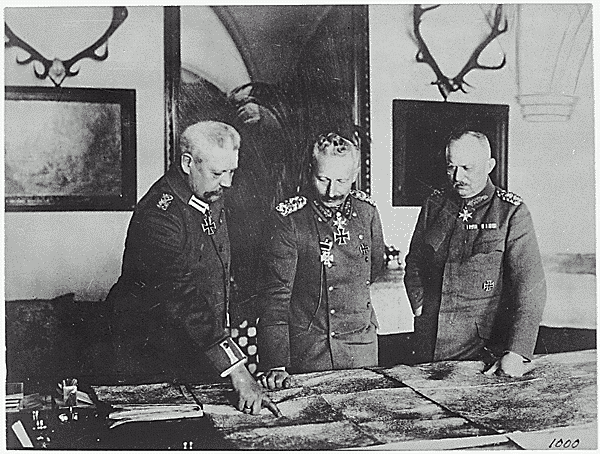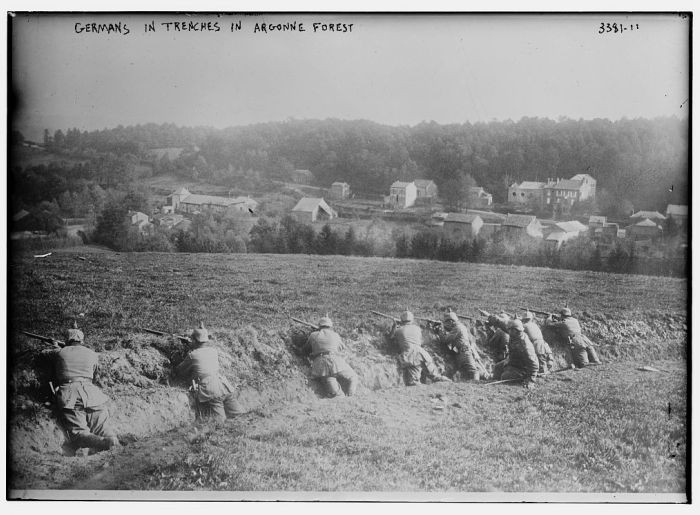
Erich Ludendorff
Erich Ludendorff was a German general who gained renown during the First World War, primarily for his efforts on the eastern front. He and future German President Paul von Hindenburg built a military empire in the east that lasted until the Germany’s defeat in 1918. Ludendorff was deeply antisemitic, an early supporter of Hitler, and a high-profile supporter of the false “Stab-in-the-Back” theory.
Key Facts
-
1
Ludendorff, along with Hindenburg, was responsible for the decisive defeat of Russian forces and for the creation of a vast state of German military occupation in Eastern Europe during World War I.
-
2
Ludendorff was pivotal in the creation and diffusion of the fictitious “Stab-in-the-Back” myth, which blamed Jews, liberals, communists, democrats, and war profiteers for the defeat of Germany in World War I.
-
3
Ludendorff was an early supporter of the Nazi Party and participated directly in Hitler’s Beer Hall Putsch.
Ludendorff’s Early Life and Career
Erich Ludendorff was born in 1865 in East Prussia (now part of Poland) into a formerly aristocratic family who had fallen onto hard times. He joined the German army and rose rapidly through the ranks to prestigious posts in the War Academy and German General Staff. In demeanor, he was aggressive and outspoken. His demands for an expansion of the German military were viewed as extreme at the time, and he was demoted to regimental duties in 1913.
Ludendorff and World War I

Ludendorff’s career improved when World War I broke out a year later. As a newly appointed army chief of staff, he helped plan some of the German army’s greatest victories, such as the Battle of Liege and the great German victory at Tannenberg, both in 1914. However, it was his role in the east in 1916 that brought Ludendorff to greater prominance. As Hindenburg’s second in command, he helped to instigate not only the defeat of Russian forces and their surrender but also the creation of a vast military state known as Ober Ost.
Ludendorff and Ober Ost
While stalled in the west, the German army won decisive battles in the east. It conquered immense territories including all of Poland and much of Russia. This occupied territory became known as the Ober Ost [short for “Oberbefehlshaber der gesamten Deutschen Streitkräfte im Osten,” or "Supreme Commander of All German Forces in the East”], after the designation for the commanders of the region. The vast occupied military empire over which Hindenburg and Ludendorff exercised almost unlimited power was significant for two reasons. First, it was, in many ways the realization of the idea of Lebensraum that Adolf Hitler and his Nazi Party would seek to accomplish during World War II. Second, it created a history of German occupation that would influence Jewish reactions to the Holocaust.
Hindenburg and Ludendorff governed this region with relatively little interference from the German government. They exploited the region's resources and meddled in political matters. While they held a paternalistic and often prejudiced perspective, Hindenburg and Ludendorff were also concerned with bringing “culture” and “civilization” to the area. Jews were not treated much differently than other ethnic groups. One German historical mission even worked to document and preserve old wooden synagogues. The rather benign treatment of Jews in this context played a role in later Jewish deliberations on responses to the German invasion of the east in World War II.
Ultimately, Ludendorff saw Ober Ost as a territory that could be settled and “civilized,” but he did not hold the same radical vision that Hitler later espoused. Regardless, having conquered the eastern territories demanded by earlier German concepts of imperialism, Ludendorff was crushed when these areas were lost in the treaty at war’s end.
As World War I became increasingly desperate for the Germans, Ludendorff planned a last massive offensive in 1918. The offensive failed , leaving Germany exposed to an Allied invasion. Eventually recognizing impending defeat but unwilling to be part of it, he resigned from the army on October 26, 1918, just weeks before the armistice. Ludendorff fled to neutral Sweden.
The Stab-in-the-Back Myth, Ludendorff, and Hitler
Ludendorff was among the many who portrayed Germany’s new civilian government as responsible for Germany’s defeat. Almost immediately, Ludendorff began to proclaim in speeches, books, and articles the myth of the “Stab-in-the-Back.” He argued that Germany had not been militarily defeated but rather had been sabotaged by liberals, communists, war profiteers, and Jews on the home front. In this way, he also sought to avoid his own responsibility for the defeat. Even while in command, Ludendorff had told senior officers that “those circles [meaning liberal politicians and their allies] must be brought into the government…whom we have above all to thank for having brought us to this point.”
Other right-wing groups, such as the Pan-German League, picked up his rhetoric. Pan-German League president Heinrich Class announced that “the situation should be used for a fanfare against Jewry and the Jews as lightning conductors for all injustices.” Ludendorff’s high-profile support of this malicious interpretation led him into Nazi circles in the 1920s, as did his Social Darwinist view of war. He became a strong supporter of the fledgling Nazi Party and of its leader, Adolf Hitler.
The support of a figure of Ludendorff’s prominence was important to the Nazi cause. Ludendorff took part in Hitler’s ill-fated Beer Hall Putsch in November, 1923, but was acquitted of all charges at trial in 1924. In 1925, he ran for German president against his former superior, Paul von Hindenburg and after his loss dabbled in radical right-wing politics.
Ludendorff and Hitler had already parted ways by the time of the Nazi takeover of power in 1933. Ludendorff was no longer sympathetic to the Nazi Party. Hitler and many of his inner circle had distanced themselves from Ludendorff over his increasingly erratic and bizarre beliefs. Ludendorff died of cancer in 1937, but his anti-democratic and antisemitic “Stab-in-the-Back” contention remained a powerful weapon in the Nazi propaganda arsenal.
Critical Thinking Questions
- Investigate Ludendorff's trial after the Putsch. Why was he acquitted? How did this compare to Hitler’s prosecution?
- How and why are myths like the Stab-in-the-Back theory created, and why do they persist, despite evidence to the contrary?
- Consider how political passions and ideology drive explanations of critical events in your country’s history, or current affairs, whether the facts are correct or incorrect.

